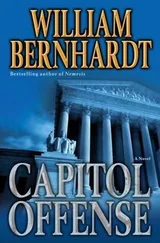William Bernhardt - Primary Justice
Здесь есть возможность читать онлайн «William Bernhardt - Primary Justice» весь текст электронной книги совершенно бесплатно (целиком полную версию без сокращений). В некоторых случаях можно слушать аудио, скачать через торрент в формате fb2 и присутствует краткое содержание. Год выпуска: 1991, ISBN: 1991, Издательство: Five Star, Жанр: Старинная литература, на английском языке. Описание произведения, (предисловие) а так же отзывы посетителей доступны на портале библиотеки ЛибКат.
- Название:Primary Justice
- Автор:
- Издательство:Five Star
- Жанр:
- Год:1991
- ISBN:9780345486967
- Рейтинг книги:4 / 5. Голосов: 1
-
Избранное:Добавить в избранное
- Отзывы:
-
Ваша оценка:
- 80
- 1
- 2
- 3
- 4
- 5
Primary Justice: краткое содержание, описание и аннотация
Предлагаем к чтению аннотацию, описание, краткое содержание или предисловие (зависит от того, что написал сам автор книги «Primary Justice»). Если вы не нашли необходимую информацию о книге — напишите в комментариях, мы постараемся отыскать её.
Primary Justice — читать онлайн бесплатно полную книгу (весь текст) целиком
Ниже представлен текст книги, разбитый по страницам. Система сохранения места последней прочитанной страницы, позволяет с удобством читать онлайн бесплатно книгу «Primary Justice», без необходимости каждый раз заново искать на чём Вы остановились. Поставьте закладку, и сможете в любой момент перейти на страницу, на которой закончили чтение.
Интервал:
Закладка:
“Oh, right.” Ben saw that most of the bar’s attention was fixed in his direction.
“Look,” he said loudly, “I’m going to pass around a photograph and I want to talk to anybody who knows anything about this man. And I mean anyone .” He cast a mean look in the direction of his former adversaries.
“Don’t press your luck,” Christina whispered.
Ben passed the picture to Skull, who accepted it without saying a word. Mona’s identification of Ben as a cop seemed to have seriously altered the degree of respect he was receiving.
“He’s been here,” Skull said after examining the picture a moment. “Not recently, but he’s been here.”
“Do you remember if he was here Monday night, last week?”
“Yeah. That sounds right. He sat in one of the back booths talking to some other guy. I guess it was a guy—I never actually saw a face. Was wearing a long white overcoat with one of those high collars. They both left together. That’s all I know.”
Why is it, Ben wondered, other strangers come here and go unnoticed and unmolested, but I’m here maybe ten minutes and practically a dead man? He circulated the picture throughout the bar. A few people remembered seeing Adams the night he was killed, but no one had anything to add to what Skull (whose actual name turned out to be Marvin) had said. No one had seen the face of the person he talked with.
Ben returned the photo to his wallet and started toward the door. He saw Mona and stopped.
“Thanks,” he said.
She placed her right hand against his cheek. “I’ve missed you, Ben. Ever since the night of the party. It meant a lot to me. I think about you all the time. You haven’t been returning my calls.”
Ben smiled uncomfortably. He couldn’t tell whether Christina was hearing this.
Mona twirled her finger through a lock of his hair. “You don’t have to run off, you know. The night is young.”
Ben took a step back. “Thanks, but I have a court hearing tomorrow morning.”
“Hey,” Marvin said, stepping beside Ben, “I’m sorry about everything, man. I mean, the darts and the rough stuff. I’ve been drinking. I got a little crazy—you know how it is. I didn’t know you were friends of Mona’s. Maybe we could all get together sometime and double date or something.”
Ben swallowed. “Yeah, or something.”
“Yeah, it’d be fun, huh?” Marvin put his arm around Mona, then slapped her on the backside.
Mona gave him a chilly smile. She clearly had not forgotten his earlier remark.
Ben waved, and he and Christina left the bar. The cool night air was bracing. “I feel like I just crawled away from the edge of a crumbling cliff,” he said.
Christina smiled. “You know, that Marvin dude was kind of scary at first, but when you got to know the real man inside, he was all right. Kind of cuddly, actually.” Ben didn’t say a word.
24
TEN AFTER TEN. THE judge was late.
Probably reading the briefs at the last moment, Ben mused. He hoped the waiting didn’t last much longer. Bertha sitting in the chair next to him at the defendants table, was already so nervous Ben had serious misgivings about having her testify. But he had no choice. She was his only witness.
He had tried to calm her; he carefully described a domestic proceeding to her as a sort of miniature trial without a jury and most of the procedural hassles. Despite his efforts, the idea of cross-examination and Perry Mason tactics sent her into a quiet panic.
Not that Bertha had an exclusive on nervousness. Ben felt a trembling in his knees he feared would not disappear when he stood up to address the court. Derek, of course, was no help at all. He had ambled to the courthouse and now sat in the back row of the tiny spectators’ gallery. Earlier, Derek had opined that it would not be to their advantage to have more lawyers sitting at their table than the Department of Human Services did. The Raven firm already had a reputation for being overpriced big shots—the kind of lawyers state court judges, who typically come from small firms or unsuccessful solo practices, hate. They didn’t want to seem to be overdoing it or trying to strong-arm the judge. Therefore, Derek explained, he would not sit at counsel table with Ben and Bertha.
Besides, Derek had told Ben, you have to learn to fly solo sometime. Being in court is a long series of tough, quick decisions made by the seat of your pants. It won’t do you any good to have me there to defer to when the hard decisions come. This is your chance to prove you have the fire of a litigator. So Derek sat calmly in the back of the courtroom while Ben prepared to bring the experience of not quite two weeks of private practice to bear before the court.
Ben checked his watch. Ten-fifteen.
What’s taking so long? The trembling in his knees became more pronounced. He looked back at Derek. Derek seemed to be in a perfectly wretched mood, even by Derek’s standards. Rumor had it that he had separated from Louise, was living by himself in an apartment on the south side, and spending entire nights in high-class watering holes. Great. Derek never struck Ben as being all that stable even in the best of circumstances, which these evidently weren’t.
Mercifully, Emily would be spared the full proceeding, although she had to be available if either side wished to call her as a witness. Not very likely. The DHS would assume she wanted to stay where she was, and Ben knew she couldn’t help Bertha’s case. She would not be called.
Ben tried to review his notes while he waited for the judge, but it was impossible. His mind was racing. A snippet of Gilbert and Sullivan kept running through his head: “The law is the true embodiment/Of everything that’s excellent/It has no kind of fault or flaw …”
“All rise.”
Everyone in the small courtroom rose. Judge Mayberry walked into the courtroom and settled himself in the thronelike, elevated black chair. Ben marveled at the amount of ceremony even the most low-level domestic disputes judge could insist upon. Mayberry enjoyed the pomp and circumstance, the black robe, the latinate phrases, the whole legal works. Ben made a mental note to be advocative, but with the most deferential attitude toward the judge possible.
The court’s bailiff read the style of the case. “In the matter of the minor Emily X, case number FS-672-92-M. Two motions are presently before the court. The Department of Human Services has brought a motion to remove the child from her present place of residence to the custody and supervision of the DHS. In response, the court has ordered Bertha Adams to show cause why the child should not be so removed. Also, Bertha Adams has brought a motion to legally adopt the minor child Emily X.”
“Are all the parties present?” Mayberry asked. He spoke slowly, with a hint of a drawl. Ben wasn’t sure if it was the judge’s background showing through or his desire to affect a folksy, good-ol’-boy persona.
The man sitting at plaintiff’s table rose and began speaking.
“The Department of Human Services is present, your honor. My name is Albert Sokolosky.”
Sokolosky was in his mid-thirties and wore round, rimless eyeglasses, probably to affect a lawyerly look and make him appear older than he really was. He was extremely tall and thin, as if he had been held at both ends and stretched.
In a sudden rush, Ben realized he didn’t really know the protocol of the courtroom. Should I stand now? Should I wait for the judge to look at me? Why the hell isn’t Derek up here to tell me these things?
He stood. “My name is Benjamin Kincaid, your honor. I represent—”
“Just a minute, son. Give the clerk a chance to get the first name down.”
Ben waited as the woman sitting beside the bailiff painstakingly scrawled out her best guess at the spelling of Sokolosky. In domestic proceedings, true court reporters, able to silently transcribe testimony at the speed of light, were not used. Instead, a tape recording was made, and for a fee, the court would make a copy of the tape available to any party who wanted to pay a court reporter to transcribe the tape, at an exorbitant rate often exceeding the monetary value of the domestic dispute. Which explains why lawyers rarely had a transcript made of proceedings in domestic matters. Which the judges knew. Which had the unfortunate result of giving the judges carte blanche to indulge themselves in any eccentricity or petty bullying their hearts desired.
Читать дальшеИнтервал:
Закладка:
Похожие книги на «Primary Justice»
Представляем Вашему вниманию похожие книги на «Primary Justice» списком для выбора. Мы отобрали схожую по названию и смыслу литературу в надежде предоставить читателям больше вариантов отыскать новые, интересные, ещё непрочитанные произведения.
Обсуждение, отзывы о книге «Primary Justice» и просто собственные мнения читателей. Оставьте ваши комментарии, напишите, что Вы думаете о произведении, его смысле или главных героях. Укажите что конкретно понравилось, а что нет, и почему Вы так считаете.







